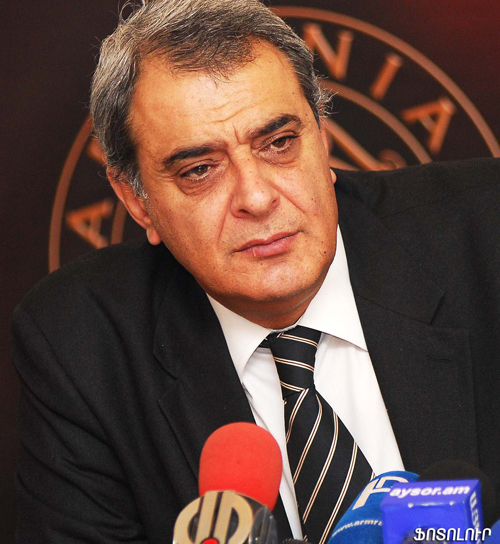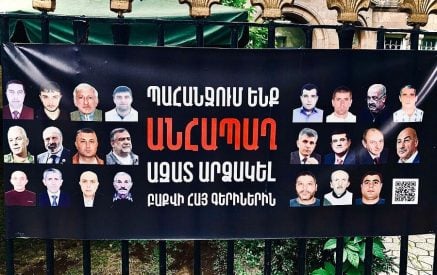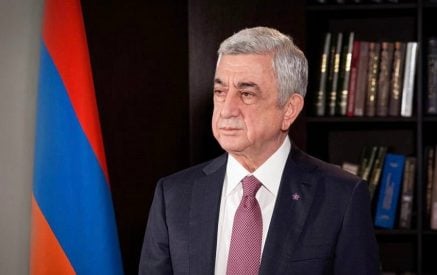Interview with David Shahnazaryan, Ambassador Extraordinary and Plenipotentiary, Special Envoy of President of Armenia in 1992-1995, chief of Armenia’s National Security Service in 1994-1995
– You were among the first to react to a speech by the US co-chairman of the OSCE Minsk Group, James Warlick, made at the Washington-based Carnegie Endowment for International Peace, describing both the fact of the speech and its content as positive. Warlick’s speech, in which he proposed a six-point peace plan for the Nagorno-Karabakh conflict, prompted a flurry of comments in Azerbaijan and Armenia. What do you think of them?
– The speech titled “Nagorno-Karabakh: The Keys to a Settlement,” made on May 7, was the “statement of official U.S. government policy.” On May 12 the OSCE Minsk Group Russian, US and French co-chairs marked the 20th anniversary of the ceasefire agreement that stopped the Armenian-Azerbaijani war for Nagorno-Karabakh with a joint statement reiterating in it the elements of a joint declaration made by the presidents of the Minsk Group co-chairing countries in l’Acquille in 2009.
The impartial conflict settlement principles proposed by Ambassador Warlick contain some new elements, which in my opinion benefit Armenia and are fully in line with Yerevan’s officially declared conflict settlement principles – the international community’s recognition of the Nagorno-Karabakh people’s right to self-determination, ensuring its population’s and borders’ security and a common border with Armenia.
Read also
Therefore, Armenia should step up the peace process within the OSCE Minsk Group framework and declare its readiness to work on a draft framework peace agreement (a ‘roadmap’), based on Warlick’s proposals.
Embracing this policy and consistently implementing it would be the last chance for Armenia and Nagorno-Karabakh to avoid becoming part of the Russian empire again. The alternative to it is the Putin-Dugin program under which Russia becomes the sole mediator for the Karabakh conflict by neutralizing the OSCE Minsk Group format and replacing Yerevan in negotiations with Azerbaijan.
Russia has already conveyed its proposals to Azerbaijan, urging it to give up its close political and energy cooperation with the West, to return to Russia-controlled political and economic orbit and to agree to Russian military presence on its territory (this is Russia’s number one goal). In return Moscow promises to hand Nagorno-Karabakh and the surrounding districts to Baku.
This plan is part of Putin’s neo-imperial policy. It has brought about a new situation in the conflict and a serious threat to the interests of all the conflicting parties – Nagorno-Karabakh, Azerbaijan and Armenia.
Azerbaijan can not fail to realize this threat and perhaps it was the reason behind its Foreign Minister Elmar Mammadyarov’s response to Warlick’s speech. He stressed that Azerbaijan is ready to negotiate over Warlick’s proposals and also declared officially that Azerbaijan is ready for international peacekeeping operation in the conflict zone, something the official Baku had always objected to.
By accepting Warlick’s proposals Azerbaijan has actually revised its previous stance, which was to restore the status quo ante bellum, which it reiterated to make the international community force Armenia to return it what it lost in a war it had itself initiated.
– What could you say about a possible international peacekeeping operation in the conflict zone?
-Neither the OSCE Minsk Group co-chairing countries not neighbors of Armenia and Azerbaijan should be involved in the international peacekeeping operation. In short, it must not include Russian and Turkish troops. Neither the Russia-controlled Collective Security Treaty Organization (CSTO) nor NATO should be involved in it.
There are four basic questions which will have to go through a very complicated stage of reconciliation by the Minsk Group co-chairing countries – a) which countries should implement the international peacekeeping mission, b) what authority and mandate it should be awarded, c) which country should take the command and d) where exactly each country should deploy its troops.
Reaching agreement on all these questions is very hard amid the mounting tension between Russia and the West, but not impossible if the interests of their own peoples and a dignified peace are the priorities of the conflicting sides.
– Which option is more beneficial to Armenia? Warlick’s proposals or the 1997 stage-by-stage option?
Warlick’s proposals and the stage-by-stage conflict settlement option proposed back in 1997 have the same rationale, basis and approaches. However, it is impossible to make an expert comparison between two agreements with absolutely different principles/elements and goals.
The stage-by-stage option presented by the OSCE Minsk Group co-chairs to the three conflicting sides in 1997 was a comprehensive agreement calling for an end to the armed conflict; it was not a document on conflict settlement principles, as proposed by James Warlick.
An expert comparison between Warlick’s proposals and the 1997 stage-by-stage option will be possible if Warlick’s proposals are used to draw a conflict settlement roadmap with concrete wordings and time frames. It requires a serious, complicated and responsible negotiation process with meticulous formulations because ‘the devil is in the detail.’
– Warlick’s critics say that the status quo must be preserved and that ‘no inch of land must be returned to Azerbaijan’
Incidentally, those who defend the status quo lashing out at Warlick had not reacted to Russia’s foreign minister Sergey Lavrov’s comments when in 2013 May he said actually the same. He, particularly, argued that ‘preservation of the status quo is unacceptable to all the sides,’ and that ‘preserving the status quo means giving no solution to the question of returning Azerbaijani lands.” The main counterargument of Warlick’s critics is that the status quo can not be changed given Russia’s announcement that only it can do so and only when it is beneficial to it.
Let me explain. Status quo is not only the line of contact, but the whole factual situation at a given moment with its many elements that changed and continue changing. I would like to name some of them, which in my opinion are decisive. The first is the balance of military forces, which Azerbaijan began to breach long time ago, largely thanks to Russia and this trend will not only continue but also enlarge because Russia is number one arms supplier to Azerbaijan.
Next is the economic factor. The economic situation in Armenia and Azerbaijan 15 years ago and now can not be compared. It is changing all the time in favor of Azerbaijan. Third, the geopolitical balance in the region has changed substantially to the detriment of Armenia, especially after last September 3 when in a dramatic about-face scuttling Armenia’s Association Agreement with the European Union, President Serzh Sarkisian announced his decision to join the Russian-led Customs Union of ex-Soviet states after a meeting with President Putin, handing, as a matter of fact, Armenia’s political and security issues to the Kremlin.
Meanwhile, Azerbaijan is pursuing a pretty independent and multi-directional foreign policy. In terms of out-emigration Armenia is ahead of Azerbaijan where the population number unlike in Armenia is on the rise.
As for energy security, Armenia’s entire energy system is under absolute Russian control, while Azerbaijan has not only preserved its own energy independence, but has made many countries dependent on its energy supplies. The next factor is the dwindling Armenia’s international influence, especially after September 3, while Azerbaijan has been spending huge amounts on increasing its influence having achieved quite tangible results.
The international community looks now at Armenia as part of Russia’s-neo-imperial policy. Therefore, the status quo is constantly changing- not in Armenia’s favor and it would be more correct for its proponents to declare that they want no settlement at all. The repetition that the status quo must be preserved benefits actually Moscow and Armenia’s criminal-oligarchic governance system controlled by the Republican Party of Armenia and its ally Prosperous Armenia Party.
Under the pretext of preserving the status quo Robert Kocharian made a coup in 1998 seizing power and declining the OSCE Minsk Group’s stage-by–stage option in order to alloy the oligarchy with power, to rob the people and make a wealth estimated at billions of dollars.
The overwhelming majority of those who claim that ‘no inch of land must be given back’ are the forces and persons for whom Russia’s current policy, the criminal oligarchy and their own interests prevail over the interests of Armenia and Nagorno-Karabakh. The forces that seized power in 1998 led by Robert Kocharian and his foreign minister Vartan Oskanian dealt at least three major blows to Armenian interests during the conflict resolution process.
First, Nagorno-Karabakh that was an internationally recognized party to the negotiation process was removed from the table.
Second, which was actually an act of treason, Armenia and Nagorno-Karabakh agreed officially to the ‘common state’ resolution option, presented by the Minsk Group co-chairs under which both Nagorno-Karabakh and all the ‘occupied regions’ were to be placed under Azerbaijan’s control with Nagorno-Karabakh forming a common state with Azerbaijan.
Third, Kocharian and Oskanian initiated a territory exchange option at the expense of Armenian land. Those who say that no inch of land must be given back had not spoken against that option. Instead they used to defend Kocharian’s that criminal initiative.
It should be clearly realized that the choice is not between handing territory and preserving the status quo but between dignified peace, safeguarding Armenia’s state and sovereignty, ensuring Nagorno-Karabakh’s security and independence on one side and ever-lasting criminal-oligarchic system, making Armenia part of the Russian empire and Karabakh a bargaining chip in Russia’s trading with Azerbaijan on the other side.
– There is also talk that Armenia should translate its military victory into diplomatic one.
Unlike military victories diplomatic victories are not one-sided. There are no losers in diplomatic victories. I am for translating our military victory into a dignified peace unless resources for a peaceful settlement are not exhausted at all.
-Azerbaijan has launched a campaign of persecution against prominent human rights activists and journalists accusing them of spying for Armenia. The government-initiated campaign is being backed by media, political and civic leaders. Even Azerbaijan’s first president Ayaz Mutalibov has joined this campaign. How would you comment on these developments?
The announcements by some political leaders, experts and journalists in Azerbaijan that this campaign of political persecution was started at Moscow’s initiative are consistent with reality. Russian special services exercise a variety of influential leverages at high echelons of Azerbaijani government, more than one can imagine, to do so.
Russian ambassador to Armenia. Ivan Volynkin’s recent controversial calls for the Armenian authorities to crack down on local Western-funded civic groups critical of Russia, should be viewed in the same context. Contacts between Armenians and Azeris, joint initiatives of Armenian and Azerbaijani non-governmental organizations and declarations by Armenian and Azerbaijani experts on the peaceful settlement of the conflict benefit neither Russian nor Azerbaijan’s interests.
As for former president Ayaz Mutalibov, his calls ‘to punish Azeris spying for Armenia’ are a political order. Mutalibov seems to be suffering from amnesia. Being sure that he will read these lines I would like to advise him that he take a deep breath and relax, otherwise I will be forced to cite some episodes of his biography to refresh his memory.
Interview by Emma Gabrielyan























































